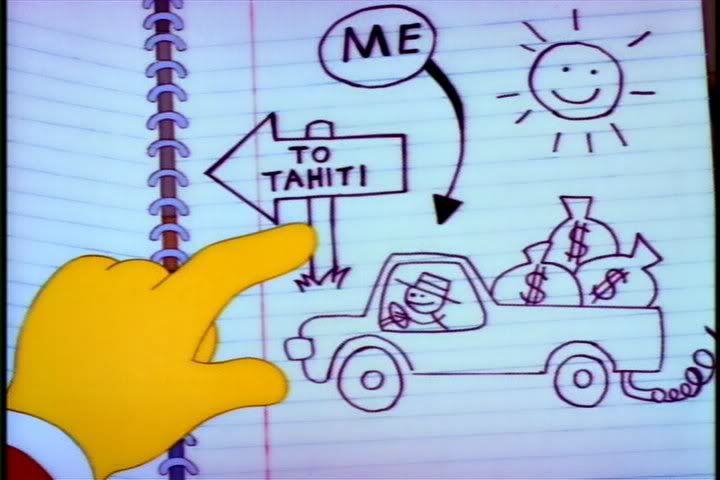
"monorail...monorail...monorail"
Posted on 04/02/2012 8:30:18 AM PDT by SeekAndFind
California has a budget deficit north of 10 billion dollars a year, a debt that's over 600 billion dollars, and businesses are already fleeing the state because of the ridiculous regulations, high taxes, and unfriendly business climate. So, is California buckling down and starting to do the tough, but necessary work needed to get the state back on track? Well, only if you consider spending almost 70 billion dollars more on a high speed rail project that's practically guaranteed to be a disastrous money pit before it’s ever built to fit that definition.
State transportation officials have slashed the price tag for California's controversial high-speed rail project by $30 billion and expanded the first stretch of track to run from Merced in the Central Valley south to the San Fernando Valley in Los Angeles.
…The drastic revision, which puts the proposed cost of the system at $68.4 billion instead of the $98.5 billion estimated in November, intends to cool opposition to the project, which has been labeled a “train to nowhere” for its plans to start in the state’s rural center, and criticized for its high costs and uncertain funding plan.
California is spending roughly a quarter of its budget paying just THE INTEREST on its debt and it’s going to toss $70 billion more down a rathole? What would make anyone in his right mind think this is a good idea? Do people just hear the words “future” and “train” together and think it’s a can’t miss project?
How’s that working out with Amtrak? About as well as the maiden voyage of the Titanic — but of course, it’s not high speed rail. If it was, judging by the experience shown in Europe, it would probably be losing a lot more money.
In 2008, Amtrak’s inspector general published an analysis of government subsidies to passenger rail in Europe and compared them to Amtrak’s subsidies. One purpose of the review was to address the contention that passenger rail in other countries, especially HSR, operates at a profit (i.e., without subsidies). For 1995-2006, the study found that the governments of Germany, France, the United Kingdom, Spain, Denmark, and Austria spent “a combined total of $42 billion annually on their national passenger railroads.”[9] The $42 billion that these six countries, which have a combined population of 269 million, spent on just passenger rail in 2006[10] is roughly proportionate to the $54.8 billion (most of which was funded by user fees) that the government of the United States (population of 309 million) spent on all forms of transportation, including highways, rail, aviation, water transport, and mass transit.[11]
To put the European commitment to passenger rail in perspective, rail ridership (high speed, conventional intercity, and metropolitan commuter rail) in these six countries accounted for just 7.9 percent of all surface transportation modes on a per passenger, per billion kilometer basis. This suggests that these countries received a poor return on their money given that more than 90 percent of passengers in these countries chose other travel modes– mostly auto–despite the subsidies.
In Europe as a whole (EU-27), rail accounted for only 6.1 percent of passenger travel in 2007, including travel by air and sea. Buses accounted for 8.3 percent of the market, and air travel accounted for 8.8 percent. Despite Europe’s huge investment in passenger rail, its market share declined from 6.6 percent in 1995 to 6.1 percent in 2007. Over that same period, commercial air increased its share from 6.3 percent to 8.8 percent. By providing faster service and competitive prices, it took passengers away from rail, buses, and autos.
What’s a better use of 70 billion dollars for California? Creating a high speed rail line that’s a cant-miss failure or paying off part of its massive debt that is increasingly likely to cause the state to default within the next decade? If your answer is “build a choo-choo to nowhere,” then congratulations, you’re one of the people who’s helping to ruin the state of California.
Europe spends a fortune on rail, but often the cheapest way to get from A to B is via private bus companies. Those would work well in CA, but they receive little attention. Point to point private buses as now frequently used and receive no public funding.
California and the High_Speed Rail Job
The Sequel
If it ever gets built it will waste far more than $100 billion. Government estimates for these projects are always dishonest and way too low. Once construction starts there is incentive to finish it no matter what it costs.
High speed rail into the San Fernando Valley?....And just which route will they use for that? What an f’ing joke!!!
Which means in the end it will cost $300 billion.
Can’t wait to see this “high speed train” hit the Tehachipi loop at 200 mph!
Well hell, if that’s the case build two of ‘em. Got all that money just laying around waiting to be spent.
.
Please!....someone sink this idiotic idea!!!
SWEET!!!

"monorail...monorail...monorail"
 The only place this thing will be or can be "High speed" is in the San Joaquin Valley. Once it leaves Bakersfield headed south it slows way down from so called high speed! Not to mention all the freight trains that use the same track. High speed my ass!...
The only place this thing will be or can be "High speed" is in the San Joaquin Valley. Once it leaves Bakersfield headed south it slows way down from so called high speed! Not to mention all the freight trains that use the same track. High speed my ass!...
 Tehachapi loop top speed....30 MPH
Tehachapi loop top speed....30 MPH
Disclaimer: Opinions posted on Free Republic are those of the individual posters and do not necessarily represent the opinion of Free Republic or its management. All materials posted herein are protected by copyright law and the exemption for fair use of copyrighted works.